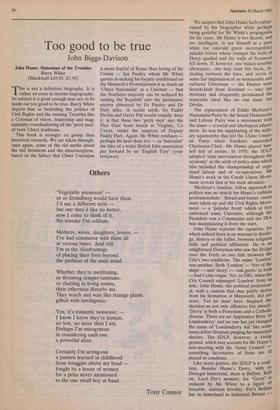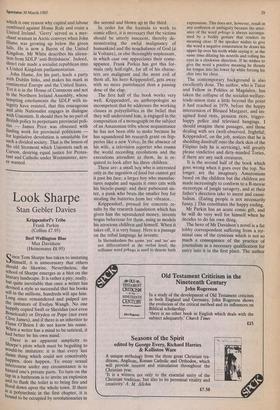Too good to be true
John Biggs-Davison
John Hume: Statesman of the Troubles Barry White (Blackstaff £10.95, £5.95)
This is not a definitive biography. It is rather an essay in interim hagiography. Its subject is a good enough man not to be made out too good to be true. Barry White depicts him as bestriding the politics of Civil Rights and the ensuing Troubles like a Colossus of vision, leadership and mag- nanimity overshadowing all the `petty men' of both Ulster traditions.
This book is stronger on gossip than historical research. We are taken through, once again, some of the old myths about the old Stormont and the misconception, based on the fallacy that Ulster Unionism is more fearful of Rome than loving of the Crown — Ian Paisley whom Mr White quotes as making his loyalty conditional on the Monarch's Protestantism is as much an `Ulster Nationalist' as a Unionist — that the Northern majority can be seduced by turning the Republic into the permissive society abhorred by Dr Paisley and Dr Daly alike. A recent myth, for Paddy Devlin and Gerry Fitt would roundly deny it, is that these two `petty men' met the Fine Gael front bench at Virginia, Co Cavan, under the auspices of Deputy Paddy Hart. Again, Mr White confuses — perhaps his hero does too — as `federalist' the idea of a wider British Isles association put forward by an `English Tory' (your reviewer). We suspect that John Hume feels embar- rassed by his biographer while perhaps being grateful for Mr White's propaganda for his cause. Mr Hume is too decent, and too intelligent, to see himself as a pure white (or emerald green incorruptible) paladin before whose trumpet the walls of Derry quailed and the walls of Stormont fell down. If, however, one makes sensible
allowances, one may read this book, in- cluding between the lines, and arrive at
some fair impression of an honourable and
cultured Ulsterman — the Humes were Scotch-Irish from Scotland — who has
tirelessly and eloquently proclaimed the separatist ideal like no one since Joe Devlin.
The replacement of Eddie McAteer's Nationalist Party by the Social Democratic and Labour Party was a movement with
the times — a social and ideological adjust- ment. So was the supplanting of the milit-
ary squirearchy that led the Ulster Union-
ist Party when Faulkner succeeded Chichester-Clark. Mr Hume placed him-
self left of centre. In 1970, the SDLP adopted 'state intervention throughout the economy' as the sixth of policy aims which
also included the championship of orga- nised labour and of co-operatives. Mr Hume's work in the Credit Union Move- ment reveals him at his most altruistic.
'McAteer's familiar, folksy approach to politics was no match for Hume's ruthless professionalism.' Bread-and-butter issues
were taken up and the Civil Rights Move- ment — a `popular front' which at first embraced some Unionists, although the President was a Communist and the IRA was manipulating it from the start. John Hume rejected the equation, for which indeed there is no warrant in theolo-
gy, history or the ballot, between religious faith and political affiliation. He is an enlightened Derryman who saw the Bridge over the Foyle as one link between the City's two traditions. The name 'London was another. Both 'London' — `fort of the ships' — and `deny' — `oak grove' in Irish — had Celtic origin. Yet, in 1983, when the
City Council expunged 'London' from its title, John Hume, the political profession-
al, with a caution that may partly derive from his formation at Maynooth, did not react. Yet he must have despised the decision as not only offensive but absurd. `Derry' is both a Protestant and a Catholic diocese. There are no Apprentice Boys `of Londonderry' and no one has yet changed the name of `Londonderry Air' like some loony leftist librarian purging his municipal shelves. The SDLP, however, is losing ground, which may account for Mr Hume's non-meeting with the `Army Council' -- something Secretaries of State are ill placed to condemn. Like many parties, the SDLP is a coali- tion. Besides Hume's Derry, with its Donegal hinterland, there is Belfast. Roll on, Lord Fitt's memoir; for `Gerry' is reduced by Mr White to a figure of loveable, indolent frivolity. Fitt's Belfast has its hinterland in industrial Britain --- Which is one reason why capital and labour combined against Home Rule and resist a United Ireland. 'Gerry' served as a mer- chant seaman in Arctic convoys when John Hume was growing up below the green hills. He is now a Baron of the United Kingdom. Mr White describes his aliena- tion from SDLP 'anti-Britishness'. Indeed, direct rule made a socialist republican into a United Kingdom parliamentarian.
John Hume, for his part, leads a party With Dublin links, and makes his mark in continental Europe and the United States. Yet it is in the House of Commons and not in the Northern Ireland Assembly, whose tempting emoluments the SDLP with in- tegrity have resisted, that this courageous and able Nationalist engages in dialogue With Unionists. It should then be no part of British policy to perpetuate provincial poli- tics — James Prior was obsessed with finding work for provincial politicians — for legislative devolution is unsuitable for such a divided society. That is the lesson of the old Stormont which Unionists such as Carson, desiring equal justice for Protes- tant and Catholic under Westminster, nev- er wanted. •















































 Previous page
Previous page